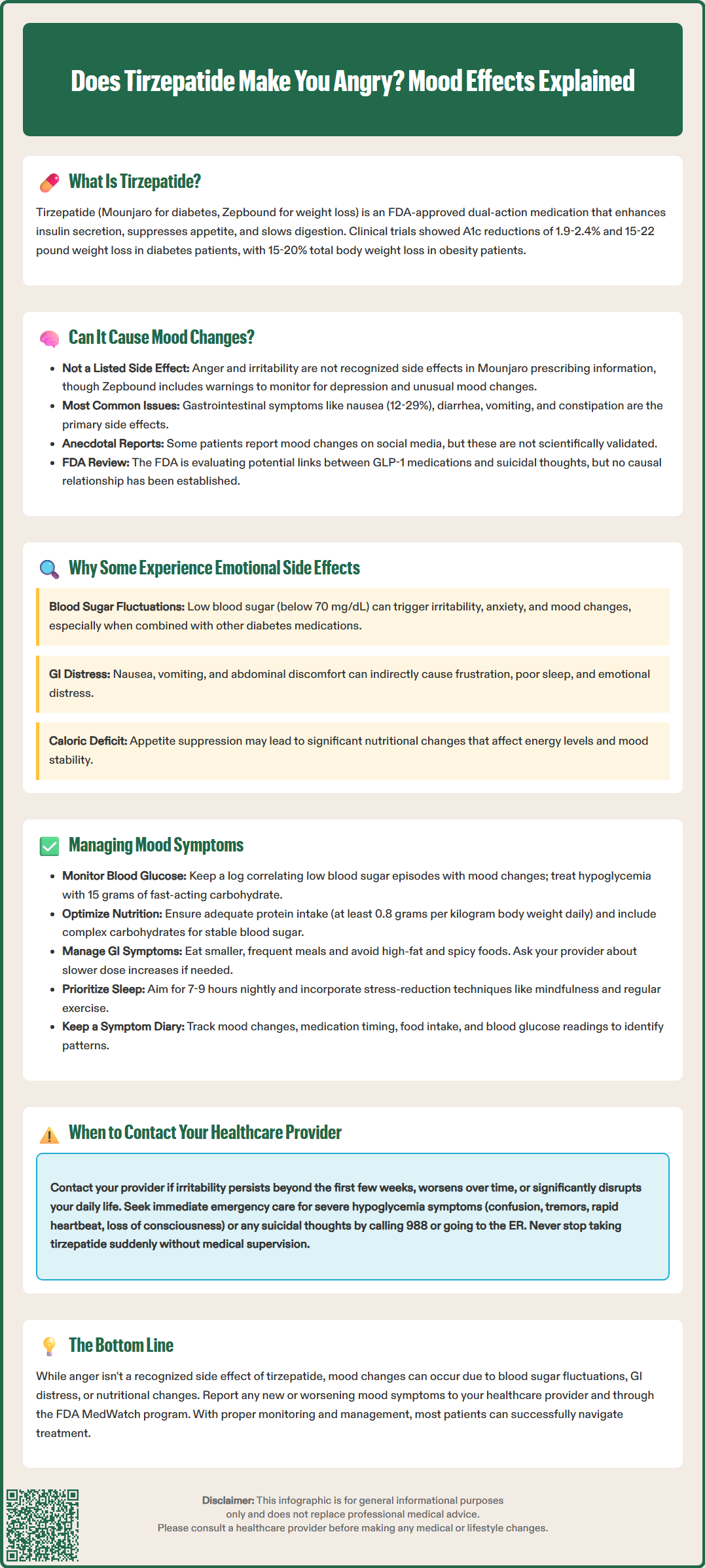LOSE WEIGHT WITH MEDICAL SUPPORT — BUILT FOR MEN
- Your personalised programme is built around medical care, not willpower.
- No generic diets. No guesswork.
- Just science-backed results and expert support.
Find out if you’re eligible

Does tirzepatide make you angry? This question concerns patients prescribed Mounjaro or Zepbound, FDA-approved formulations of tirzepatide for type 2 diabetes and weight management. While anger and irritability are not listed as recognized adverse effects in the Mounjaro prescribing information, the Zepbound label includes warnings to monitor for mood changes, depression, and suicidal thoughts. Understanding the relationship between tirzepatide and emotional symptoms requires examining clinical evidence, potential indirect mechanisms, and individual patient factors that may influence mood during treatment.
Quick Answer: Tirzepatide is not documented to directly cause anger, though Zepbound's label warns providers to monitor for mood changes and depression.
Tirzepatide is a dual glucose-dependent insulinotropic polypeptide (GIP) and glucagon-like peptide-1 (GLP-1) receptor agonist approved by the FDA for the treatment of type 2 diabetes mellitus and chronic weight management. It is marketed as Mounjaro for diabetes and Zepbound for weight management in adults with a BMI ≥30 kg/m² or ≥27 kg/m² with at least one weight-related comorbidity.
The medication works by activating both GIP and GLP-1 receptors, enhancing insulin secretion in a glucose-dependent manner, suppressing glucagon release, slowing gastric emptying, and reducing appetite. This leads to improved glycemic control and weight loss. Tirzepatide is initiated at 2.5 mg subcutaneously once weekly for 4 weeks as a starting dose to improve gastrointestinal tolerability, then gradually titrated every 4 weeks up to a maximum of 15 mg weekly based on therapeutic response and tolerability.
In the SURPASS clinical trial program for type 2 diabetes, tirzepatide demonstrated A1c reductions of 1.9% to 2.4% and weight loss averaging 15 to 22 pounds, depending on the dose. The SURMOUNT trials for obesity management showed weight loss of approximately 15-20% of body weight. These outcomes have made tirzepatide a valuable option for eligible patients with type 2 diabetes and those requiring medical weight management.
Important safety considerations include contraindications in patients with personal or family history of medullary thyroid carcinoma (MTC) or Multiple Endocrine Neoplasia syndrome type 2 (MEN2), and in those with hypersensitivity to tirzepatide. Key warnings include risk of thyroid C-cell tumors, pancreatitis, gallbladder disease, risk of acute kidney injury with severe gastrointestinal adverse reactions, and potential diabetic retinopathy complications. Zepbound also carries a warning to monitor for depression and suicidal thoughts or behaviors.
As with any medication affecting metabolic and hormonal pathways, questions arise about potential effects beyond glucose control and weight loss, including impacts on mood and emotional well-being.
The FDA-approved prescribing information for Mounjaro (tirzepatide for diabetes) does not list anger or irritability as recognized adverse effects. However, the Zepbound (tirzepatide for weight management) label includes a warning to monitor patients for depression, suicidal thoughts or behavior, and any unusual changes in mood or behavior. The most commonly reported side effects in clinical trials were gastrointestinal, including nausea (occurring in 12-29% of patients), diarrhea, vomiting, constipation, and abdominal discomfort. These symptoms typically diminish over time as patients adjust to the medication.
While clinical trials did monitor for psychiatric adverse events, they did not specifically focus on irritability or anger as primary endpoints. The FDA has issued a Drug Safety Communication regarding ongoing evaluation of suicidal thoughts and actions in patients taking GLP-1 receptor agonists, including tirzepatide, though a causal relationship has not been established.
Anecdotal reports from patients on social media platforms and online forums have mentioned experiencing irritability, mood swings, or emotional changes while taking tirzepatide. However, these reports are not scientifically validated and cannot establish a causal relationship. Patient experiences vary widely, and multiple factors beyond medication can influence mood and emotional state.
It is important to distinguish between a documented adverse effect and an individual patient experience. While some patients may perceive mood changes during tirzepatide therapy, current clinical evidence does not establish a direct link between tirzepatide and anger or irritability specifically. Healthcare providers should remain attentive to patient-reported symptoms while recognizing that correlation does not necessarily indicate causation. Patients experiencing new or worsening mood symptoms should report them to their healthcare provider and through the FDA MedWatch program.

Several physiological and psychological factors may potentially explain why some patients report mood changes or irritability while taking tirzepatide, even without established direct pharmacological effects on mood regulation. These hypothetical mechanisms may help contextualize emotional symptoms that arise during treatment.
Hypoglycemia and blood sugar fluctuations represent one plausible explanation. According to the American Diabetes Association, hypoglycemia (blood glucose <70 mg/dL) commonly manifests with irritability, anxiety, confusion, and mood changes. Although tirzepatide's glucose-dependent mechanism reduces hypoglycemia risk compared to insulin or sulfonylureas, it can still occur, particularly in patients taking multiple diabetes medications. Even if not meeting clinical hypoglycemia thresholds, some individuals may be sensitive to glucose fluctuations.
Gastrointestinal distress is the most common side effect of tirzepatide and can indirectly impact mood. Persistent nausea, vomiting, or abdominal discomfort can lead to frustration, sleep disruption, and reduced quality of life. Chronic physical discomfort is a well-recognized contributor to irritability and emotional distress. Patients experiencing significant GI symptoms may attribute their mood changes to the medication itself rather than to the secondary effects of physical discomfort.
Caloric restriction and nutritional changes may also play a role. Tirzepatide's appetite-suppressing effects can lead to substantial caloric deficits. Significant changes in eating patterns and nutritional intake may affect some individuals' energy levels and mood stability, though research specifically linking tirzepatide-induced dietary changes to mood effects is limited.
Other factors that may contribute include sleep disruption, stress related to lifestyle changes, or pre-existing mood conditions that become more apparent during treatment. Additionally, patients should be evaluated for other common causes of irritability, including sleep disorders, substance use, medication interactions, and underlying mental health conditions.
If you experience irritability or mood changes while taking tirzepatide, several practical strategies can help manage these symptoms while continuing to benefit from the medication's therapeutic effects. A systematic approach to identifying and addressing contributing factors is essential.
Monitor blood glucose levels regularly, especially if you are taking other diabetes medications. Keep a log of glucose readings and note any correlation between low blood sugar episodes and mood symptoms. If hypoglycemia occurs, follow the American Diabetes Association's recommendation to treat with 15 grams of fast-acting carbohydrate, wait 15 minutes, and recheck blood glucose (the "15-15 rule"). Discuss medication adjustments with your healthcare provider if hypoglycemia is recurring. Those at high risk may need a glucagon prescription.
Optimize nutrition and hydration to support both physical and emotional well-being. Work with a registered dietitian to ensure adequate protein intake (generally at least 0.8 grams per kilogram of body weight daily, with potentially higher needs during weight loss). Include complex carbohydrates to maintain stable blood sugar levels. Stay well-hydrated, as dehydration can exacerbate both GI symptoms and irritability.
Address gastrointestinal symptoms proactively to reduce their impact on quality of life and mood. Eat smaller, more frequent meals rather than large portions. Avoid high-fat, spicy, or heavily processed foods that may worsen nausea. Some patients find relief with ginger tea or other dietary modifications. For persistent symptoms, your healthcare provider may recommend a slower dose titration schedule or, in some cases, prescription antiemetics.
Maintain consistent sleep patterns and stress management practices. Sleep deprivation and chronic stress independently contribute to irritability and mood disturbances. Prioritize 7-9 hours of quality sleep nightly and incorporate stress-reduction techniques such as mindfulness, regular physical activity, or counseling support. Regular exercise has well-documented mood-stabilizing effects and complements tirzepatide's metabolic benefits.
Keep a symptom diary to identify patterns and triggers. Document mood symptoms, timing of medication doses, food intake, blood glucose readings, and other relevant factors. This information can help you and your healthcare provider determine whether mood changes are truly medication-related or attributable to other factors.
Note for women using oral contraceptives: Tirzepatide may reduce the absorption of oral contraceptives, particularly during initiation and dose increases. Use a backup contraceptive method for 4 weeks after starting tirzepatide and after each dose increase.
While mild, transient mood changes may not require immediate medical attention, certain symptoms warrant prompt communication with your healthcare provider to ensure safe and effective treatment. Recognizing these warning signs is essential for patient safety.
Contact your provider if you experience persistent or worsening irritability that interferes with daily functioning, relationships, or quality of life. Mood symptoms that do not improve after the first few weeks of treatment or that intensify over time should be evaluated. Your provider can assess whether dose adjustment, medication timing changes, or additional interventions are appropriate.
Seek immediate medical attention for symptoms of severe hypoglycemia, including confusion, difficulty concentrating, severe irritability or aggression, tremors, rapid heartbeat, or loss of consciousness. These symptoms require urgent treatment with fast-acting carbohydrates or glucagon. Recurrent hypoglycemia necessitates medication regimen review and adjustment.
Report any signs of depression, anxiety, or suicidal thoughts immediately. If you have thoughts of harming yourself, call the Suicide and Crisis Lifeline at 988 or go to the nearest emergency room. For non-emergency but concerning new or worsening depression or suicidal thoughts, contact your healthcare provider promptly. The Zepbound label specifically includes a warning to monitor for depression and suicidal thoughts or behaviors.
Seek urgent care for signs of pancreatitis, including severe abdominal pain that may radiate to your back, with or without vomiting. Also report symptoms of gallbladder disease (pain in the right upper abdomen, fever, jaundice), signs of acute kidney injury (decreased urination, swelling, dizziness), vision changes that could indicate diabetic retinopathy complications, or symptoms of thyroid tumors (neck mass, difficulty swallowing, hoarseness).
Discuss severe or persistent gastrointestinal symptoms that may be contributing to mood disturbances. Intractable nausea, vomiting, or abdominal pain may indicate the need for dose reduction, temporary treatment interruption, or evaluation for other causes.
Do not discontinue tirzepatide abruptly without medical guidance. If you believe the medication is causing intolerable mood symptoms, work with your provider to develop an appropriate plan. This may include dose adjustment, slower titration, additional supportive measures, or transition to an alternative therapy if necessary.
Anger is not listed as a recognized adverse effect in the Mounjaro prescribing information for diabetes. However, the Zepbound label for weight management includes a warning to monitor patients for depression, suicidal thoughts, and unusual mood changes.
Potential indirect causes include hypoglycemia or blood sugar fluctuations, gastrointestinal distress (nausea, vomiting), significant caloric restriction, sleep disruption, or pre-existing mood conditions. These factors should be evaluated individually with your healthcare provider.
Contact your provider if you experience persistent irritability interfering with daily life, new or worsening depression, or any suicidal thoughts. Seek immediate help by calling 988 (Suicide and Crisis Lifeline) or going to the nearest emergency room if you have thoughts of self-harm.
All medical content on this blog is created using reputable, evidence-based sources and is regularly reviewed for accuracy and relevance. While we strive to keep our content current with the latest research and clinical guidelines, it is intended for general informational purposes only.
This content is not a substitute for professional medical advice, diagnosis, or treatment. Always consult a licensed healthcare provider with any medical questions or concerns. Use of this information is at your own risk, and we are not liable for any outcomes resulting from its use.